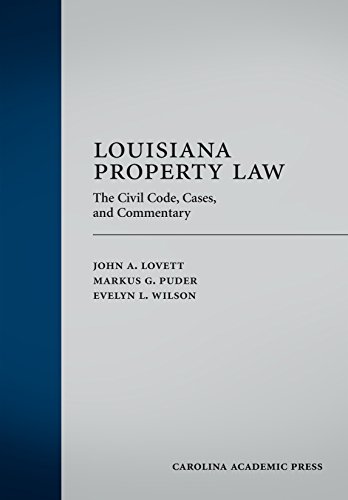John A. Lovett
Professor Louisiana State University
- Baton Rouge LA
Prof. Lovett’s scholarship ranges across common, civil, and mixed jurisdictions.
Areas of Expertise
Biography
After law school, Lovett clerked for Chief Judge F.A. Little, Jr., United States District Court for the Western District of Louisiana, and Judge Jacques L. Wiener, Jr., United States Court of Appeal for the Fifth Circuit. He worked as an associate at Liskow & Lewis in New Orleans from 1997 to 2002, focusing on commercial litigation.
Lovett joined the faculty at Loyola University New Orleans College of Law in 2002, became full professor in 2009, and served as Associate Dean for Academic Affairs and Faculty Development from 2012 to 2015. He held the De Van D. Daggett Jr. Distinguished Professorship at Loyola from 2012 to 2023.
Lovett’s teaching and scholarship focus on property law and land use in all its dimensions. He has taught Civil Law Property, Common Law Property, Louisiana Sale and Lease, Land Use Regulation, Real Estate Transactions, and Property, Land Use, and Justice, a new course he created that addresses racial discrimination in property and land use law in the United States.
Lovett’s scholarship ranges across common, civil, and mixed jurisdictions. He has published articles and book chapters on easements, covenants, and servitudes, adverse possession and acquisitive prescription, community land trusts, land reform in Scotland, the impact of natural disasters on property law and housing, and the impact of changes in our natural environment on property rights. His articles and book chapters have been published in the United States, Scotland, the Netherlands, and South Africa and have been cited widely by scholars and courts, including the Louisiana Supreme Court and the Supreme Court of Appeal of South Africa. He is also a co-author of Louisiana Property Law: The Civil Code, Cases, and Commentary (2d edition, Carolina Academic Press 2020), a widely used casebook in Louisiana law schools.
Research Focus
Property Law & Land Use Regulation
Prof. Lovett’s research focuses on property law—civil and common law property, land use, and the good‑faith principles that mediate ownership and public access. He integrates comparative doctrine, historical analysis, and policy scholarship to refine property rights, guide land‑use regulation, and inform Louisiana’s civil‑law tradition as the Newman Trowbridge Distinguished Professor at LSU Law.
Education
Haverford College
B.A.
1988
Indiana University Bloomington
M.F.A.
1991
Tulane University
J.D.
1995
Media Appearances
2 ON YOUR SIDE: Who foots bill for driveway damage caused by tree roots?
WBRZ 2 tv
2024-02-27
The hope was that the two neighbors could come to an agreement, since it appears the law is on Simon's side. A Louisiana Civil Code says that a landowner has the right to demand branches or roots of a neighbor's tree, bushes or plants that extend over or into their property be trimmed at the expense of the neighbor. LSU Law Professor John Lovett says the law is very clear.
"The real question would be whether the roots interfere with that person's enjoyment of their property, in this case the driveway," said Lovett.
Articles
Easements and Change
Loyola University New Orleans College of Law Research Paper2022
Disputes over easement relocation have a long and tortured history in American law, much more complex than the orthodox view of easement law has acknowledged. The majority mutual consent rule evolved over two centuries, but courts and judges in some states have always resisted remorseless application of the rule. Outside of the United States, many countries have employed versions of the civil law servitude relocation rule first adopted in France in 1804 and used in Louisiana for two centuries. Promulgation of Section 4.8(3) of the Restatement (Third) of Property: Servitudes in 2000 lead to a significant re-evaluation of easement relocation law in the United States. Today some form of unilateral relocation is permitted in at least half of the states and courts in five states have adopted robust versions of the Restatement approach to easement relocation.
Easements on the Move: The Uniform Easement Relocation Act
Probate & Property2022
40 asements are useful property interests that can facilitate cooperative relationships between neighboring landowners. Sometimes, however, easements can be a source of conflict. The Uniform Easement Relocation Act (UERA), recently approved and offered to state legislatures by the Uniform Law Commission (ULC), offers a carefully structured, judicially controlled framework to resolve a common conflict between a servient estate owner and an easement holder.
Adverse Possession by the State: Toward Remedial Equivalency
Loyola University New Orleans College of Law Research Paper2022
When governments embark on public projects, sometimes mistakes happen. A government might mistakenly construct part of a road or some other publicly owned facility on land that is owned by a private person without condemning that land. When this kind of mistake happens and a landowner does not object for a long period of time and a dispute later arises, the governmental entity will sometimes assert that the doctrine of adverse possession vests title in the disputed land in favor of the government or that the doctrine of common law prescription establishes an easement in favor of the government. U.S. courts almost universally recognize that these well-established common law doctrines can benefit governmental entities. Some commentators, however, have criticized the majority view of U.S. courts and called for a ban of adverse possession or prescription by the state or have recommended that a governmental entity should pay just compensation when it acquires property interests using these doctrines.
Oil, Trees, and Water: Evaluating the Transition from Natural Property Rights to Property Conventions
Loyola University New Orleans College of Law Research Paper2023
In his new book, Natural Property Rights, Eric Claeys offers a property theory grounded in a person’s ability to make productive or purposive use of a resource and the requirement of clear communication about the extent of a person’s claim to that resource. This Article illustrates some of the normative and practical advantages of Claeys’s theory by using it to explicate three property disputes that have arisen in Louisiana concerning highly contested natural resources—oil, trees, and water. The Article argues that Claeys’s theory illuminates a major focal case in the development of Louisiana’s law of the obligations of neighborhood, might have produced a more satisfying outcome in a leading case concerning the usufruct of timberlands, and could help the State of Louisiana, private landowners, and recreational sportsmen resolve disputes over ownership of submerging land and water-based access on Louisiana’s disappearing coast.
Ownership of Submerged Land on the Louisiana Coast: Resolving the Dual-Claimed Land Dilemma
Louisiana Law Review2024
Over the last seventy years, thousands of square miles on the Louisiana coast have been submerged beneath the waters of the Gulf of Mexico. Over the next fifty years, many more square miles of land will slip below the waters of the sea. Commentators have debated the legal significance of this transformation of the state’s coastal landscape for years, but uncertainty remains over a fundamental question: Who owns land that was once either dry land, marsh, swamp land, or the bed of non-navigable water body when that land becomes permanently submerged beneath the sea, an arm of the sea, or a navigable lake as a result of erosion, subsidence, or sea-level rise?




